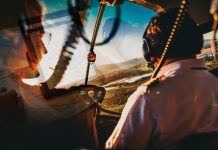As thriller novelist, Barry Eisler, once said, ‘The difference between being a victim and a survivor is often a low level of situational awareness.’ This is even more true in aviation than in Eisler’s ruthless fictional world of spies and assassins. In both worlds, killers and hazards stay hidden or innocuous until the moment of attack. Survival requires fully open eyes and a consistently suspicious demeanor.
Situational awareness (SA) is sometimes defined as an understanding of what has happened, what is happening and what might happen. It’s also about awareness of your surroundings.
Red Bull Racing pilot, Matt Hall, says that he previsualises each race so he knows what to expect and has the spare mental capacity to deal with unforeseen circumstances. ‘We can develop our ability to improve situational awareness through preparation and planning. We always look at what we want to happen, what can happen and what we don’t want to happen. When I’m in the race plane I’ve thought about it so much that no matter where I am in the track, I’m very aware of what the altitude should be, where the next pylon should be and very aware of what my next action should be. If something else pops up, I’ve got the capacity to identify it and take action,’ Hall says.
Even so, Hall had a close call during an air-to-ground gunnery competition. He describes how emotions crept up to cloud his judgement and he lost situational awareness, which almost cost him his life. After a range display data malfunctioned, combined with a desire to obtain the best score, Hall dived his RAAF F/A-18 too close to the ground without noticing. Fortunately for Hall, only one round remained, and the gun stopped firing, which was enough to pop him back into focus and recover.
Hall likens his mind to a bucket. ‘I was so emotionally engaged my bucket had filled up completely … and I failed to see everything else that was happening around me. I was physically healthy, I was mentally healthy but my emotions became too high and I missed all the external cues which said I was going to crash the aircraft. My bucket was overflowing.’
Situational awareness is one of the most critical cognitive skills a pilot needs. It is a simple concept, but also delicate. Many things can lead to your situational awareness being compromised. They include ineffective communication, fatigue and stress, high workload and challenging environmental conditions.
Loss of situational awareness (SA) continues to be identified frequently in ATSB reports. But principal human factors advisor at the Keil Centre, Melanie Todd, argues that by saying the pilot lost situation awareness or that they had poor situational awareness doesn’t get anyone anywhere. ‘You need to be promoting the actual behaviours and the techniques around situational awareness,’ Todd says.
‘Ask yourself, am I planning for arrival at the destination to discover the weather’s not what I thought it was going to be? What’s my backup? At what point am I checking that? Am I still good? You need to plan ahead and see that future.’
Situation awareness is the sixth booklet in the revised Safety behaviours: human factors for pilots’ kit. It looks at why good situational awareness matters, factors that can reduce situational awareness, how do you know when you have lost situational awareness, managing situational awareness and provides examples across industries for both professional pilots and charter operators.
Safety behaviours: human factors for pilots’ kit is out now for free on the CASA website, or can be ordered in print and on USB from the CASA Online Store.





It would be a good idea if this were freely available to car drivers, if not compulsory.
Most motorcyclists already have good SA as do many pilots, especially glider pilots.
For the average pilot it’s a good idea to practice listening to every radio call and trying to visualise where that aircraft is relative to you and your destination. And don’t forget to call yourself. She needs to be doing the same.
If we pilots did everything these boffins believe we’d never actually enjoy the thrill of flight! SA is a common sense part of our very existence on this planet, it applies to everyone who proceeded any further than their bedroom! Distraction is the biggest part of SA erosion, something that cannot be removed! Look out the window, smell the roses & enjoy flying for a change!
I agree totally.
The boffins, to earn their wages and grow their little empires, are everywhere.
But too, there are those who seem to have no awareness, for example those who stop their car at an intersection, roundabout or lane merge, and then look to see what to do.
An example that sticks in my brain is that of a pilot with engine failure making it to an airport and finding himself 500 feet directly above the middle of the runway.
Maybe one day the boffins will realize that for some people no amount of training will make them a good/safe/decent pilot or driver.
Pity.